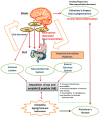A Review on the Protective Effects of Probiotics against Alzheimer's Disease
- PMID: 38248439
- PMCID: PMC10813289
- DOI: 10.3390/biology13010008
A Review on the Protective Effects of Probiotics against Alzheimer's Disease
Abstract
This review summarizes the protective effects of probiotics against Alzheimer's disease (AD), one of the most common neurodegenerative disorders affecting older adults. This disease is characterized by the deposition of tau and amyloid β peptide (Aβ) in different parts of the brain. Symptoms observed in patients with AD include struggles with writing, speech, memory, and knowledge. The gut microbiota reportedly plays an important role in brain functioning due to its bidirectional communication with the gut via the gut-brain axis. The emotional and cognitive centers in the brain are linked to the functions of the peripheral intestinal system via this gut-brain axis. Dysbiosis has been linked to neurodegenerative disorders, indicating the significance of gut homeostasis for proper brain function. Probiotics play an important role in protecting against the symptoms of AD as they restore gut-brain homeostasis to a great extent. This review summarizes the characteristics, status of gut-brain axis, and significance of gut microbiota in AD. Review and research articles related to the role of probiotics in the treatment of AD were searched in the PubMed database. Recent studies conducted using animal models were given preference. Recent clinical trials were searched for separately. Several studies conducted on animal and human models clearly explain the benefits of probiotics in improving cognition and memory in experimental subjects. Based on these studies, novel therapeutic approaches can be designed for the treatment of patients with AD.
Keywords: Alzheimer’s disease; dysbiosis; gut microbiome; gut–brain axis; neurodegeneration; neurodegenerative disorders; neurofibrillary tangles; probiotics.
Conflict of interest statement
The authors declare no conflicts of interest.
Figures
Similar articles
-
Role of gut-brain axis, gut microbial composition, and probiotic intervention in Alzheimer's disease.Life Sci. 2021 Jan 1;264:118627. doi: 10.1016/j.lfs.2020.118627. Epub 2020 Oct 22. Life Sci. 2021. PMID: 33169684 Review.
-
Exploring the gut-brain axis in alzheimer's disease treatment via probiotics: evidence from animal studies-a systematic review and meta-analysis.BMC Neurol. 2024 Dec 19;24(1):481. doi: 10.1186/s12883-024-03978-5. BMC Neurol. 2024. PMID: 39695988 Free PMC article.
-
Probiotics for Alzheimer's Disease: A Systematic Review.Nutrients. 2021 Dec 22;14(1):20. doi: 10.3390/nu14010020. Nutrients. 2021. PMID: 35010895 Free PMC article.
-
Etiology and management of Alzheimer's disease: Potential role of gut microbiota modulation with probiotics supplementation.J Food Biochem. 2022 Jan;46(1):e14043. doi: 10.1111/jfbc.14043. Epub 2021 Dec 19. J Food Biochem. 2022. PMID: 34927261 Review.
-
Emerging role of gut microbiota in modulation of neuroinflammation and neurodegeneration with emphasis on Alzheimer's disease.Prog Neuropsychopharmacol Biol Psychiatry. 2021 Mar 2;106:110112. doi: 10.1016/j.pnpbp.2020.110112. Epub 2020 Sep 16. Prog Neuropsychopharmacol Biol Psychiatry. 2021. PMID: 32949638 Review.
Cited by
-
Newer Therapeutic Approaches in Treating Alzheimer's Disease: A Comprehensive Review.ACS Omega. 2025 Feb 3;10(6):5148-5171. doi: 10.1021/acsomega.4c05527. eCollection 2025 Feb 18. ACS Omega. 2025. PMID: 39989768 Free PMC article. Review.
-
Lactobacillus Helveticus Improves Controlled Cortical Impact Injury-Generated Neurological Aberrations by Remodeling of Gut-Brain Axis Mediators.Neurochem Res. 2024 Nov 14;50(1):3. doi: 10.1007/s11064-024-04251-4. Neurochem Res. 2024. PMID: 39541016
-
The Role of Probiotics in Modulating the Gut Microbiome in Alzheimer's Disease: A Review.Foods. 2025 Apr 27;14(9):1531. doi: 10.3390/foods14091531. Foods. 2025. PMID: 40361614 Free PMC article. Review.
-
Gut dysbiosis mediates the association between antibiotic exposure and chronic disease.Front Med (Lausanne). 2024 Nov 6;11:1477882. doi: 10.3389/fmed.2024.1477882. eCollection 2024. Front Med (Lausanne). 2024. PMID: 39568738 Free PMC article. Review.
-
Probiotics and Food Bioactives: Unraveling Their Impact on Gut Microbiome, Inflammation, and Metabolic Health.Probiotics Antimicrob Proteins. 2025 Jan 14. doi: 10.1007/s12602-025-10452-2. Online ahead of print. Probiotics Antimicrob Proteins. 2025. PMID: 39808399 Review.
References
-
- Ehrlich S.D., Consortium M. MetaHIT: The European Union Project on metagenomics of the human intestinal tract. In: Nelson K., editor. Metagenomics of the Human Body. Springer; New York, NY, USA: 2011. - DOI
Publication types
LinkOut - more resources
Full Text Sources


